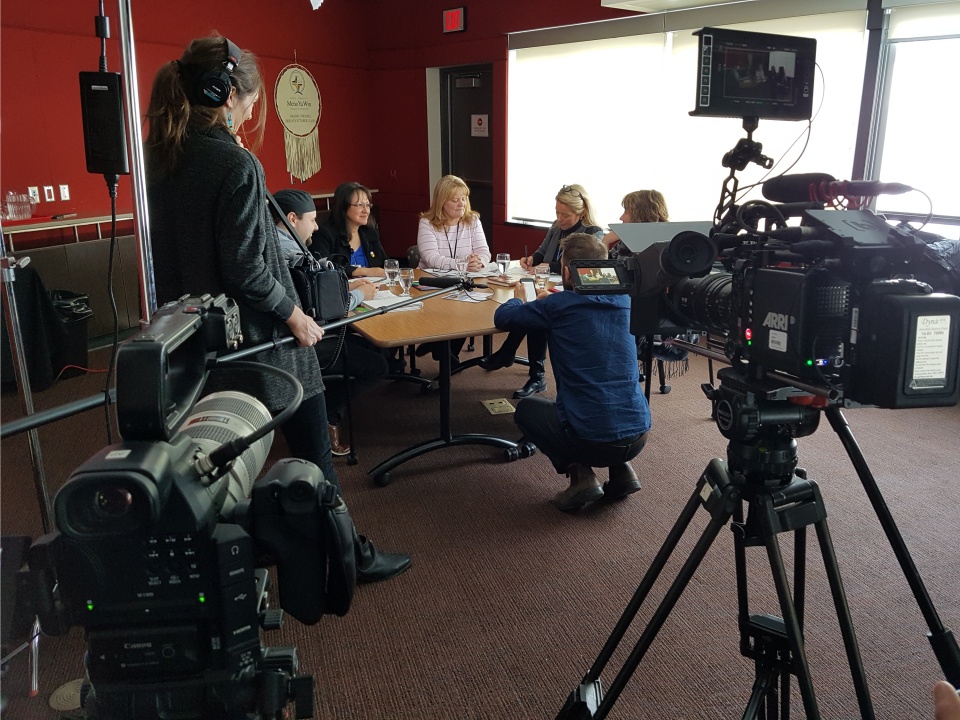Documentary features SLMHC traditional foods program: promoting reconciliation through food
SIOUX LOOKOUT, ON—Northern Ontario health care is undergoing a holistic healing renaissance and Sioux Lookout Meno Ya Win Health Centre (SLMHC) is at the heart of it all, centred and focused within a soon-to-be released documentary.

Shot over the course of a week, the cast and crew travelled from Toronto to Slate Falls First Nation to Sioux Lookout in order to capture a complete understanding of traditional First Nations foods and its place within holistic healthcare services. The idea emerged from a nationwide Nourish collaborative project on traditional foods. As part of that project, the healthcare leaders involved wanted to showcase the power of traditional foods programs at work within the country. Nourish—a McConnell Foundation initiative—received funding for the film from the Greenbelt Foundation and then partnered with documentary film-makers Adjacent Possibilities as well as SLMHC.
“We found that current colonial regulations make it difficult for indigenous individuals to access their traditional foods in most Canadian healthcare institutions,” said Hayley Lapalme, Program Facilitator for the Nourish Program. “The film aims to break down those colonial paradigms and show not only that traditional food is safe, but also that culture is essential in recovery and well-being. SLMHC’s Miichim (traditional foods) program is a leader in this work, and we want to share their inspiring story.”
SLMHC’s traditional foods program is made possible largely due to an exemption written into the Ontario Food Premises Regulation 493/17, which grants SLMHC legal status to serve uninspected meats and wild game to its patients as part of their traditional foods program.
Kathy Loon, manager of the Traditional Healing Programs at SLMHC, pointed out the necessity for traditional foods like wild meat and game in First Nations healthcare. “Miichim is an important part of the daily lives of many Anishinaabe people and is an important link between health, culture, and identity. Traditional foods can aid in healing by creating a comfortable and familiar environment for patients while in care at our hospital or our long term care facility.”
Michelle Beaulne, Director of Corporate Support Services, illustrated the cultural differences in diet. “Traditional and western food preparation can be quite distinct, especially when looking at basic ingredients. Garlic, peppers and other fresh vegetables that are very common in urban centres are typically not available in the north.”
“Serving a western stew would be so foreign, often unpalatable to our northern patients,” added Loon. “The traditional foods we now prepare are made with very simple, basic ingredients. And they are prepared in a way that fits with the majority of our patient’s doctor-ordered nutritional diets.”
Even with a unique legal status to serve uninspected meats and wild game, Beaulne explained how SLMHC is still required to show due diligence in terms of quality control. “At the onset, we knew we had to mirror all food safety and handling processes. Safety control steps have been put in place to track any uninspected wild game, right from the hunter or angler to the patient tray. We can easily retrace origin by the quality control and lot numbers that we maintain in our Miichim kitchen.”
Although a success, stocking a sufficient supply of wild meat and game to fulfill daily program needs has proven a challenge.
“Our program is only sustainable upon the donations that we receive. Over the last three years, we’ve been working to enhance donations through various partnerships, like with the Ministry of Natural Resources who now donates their confiscated wild game,” said Loon. “And with significant donations from local fishing tournaments, we haven’t purchased from commercial fisheries in over a year.”
Such innovation in collaboration is another aspect of the traditional foods program that Nourish hopes to highlight in their upcoming documentary.
“SLMHC’s Miichim program, much like similar programs at the Yukon Hospitals or anywhere serving traditional food, relies on a complex set of relationships. There are partnerships with hunters, fishers, the community, and sometimes the Ministry of National Resources; all who share donated food,” said Lapalme. “Then there’s the efforts within the organization to ensure the spirit of the program carries right through to the patient. This often means working with translators or other traditional knowledge keepers who can bridge that final gap.”
From what was once a health care system devoid of traditional knowledge and practice, SLMHC has emerged a leader in culturally-responsive programming.
Lapalme believes SLMHC and its traditional foods program is a microcosm for the kind of reconciliation that could happen across the country. “Food can be a powerful starting place for rebuilding relationships between Indigenous and non-Indigenous peoples… We know that still today there are huge disparities that exist in health outcomes for Indigenous and non-Indigenous peoples. We want to close that gap, and we know that traditional food is part of that project.”
The Miichim documentary will premiere at the Nourish Food for Health Symposium on Treaty 13 in Toronto, from May 15-16.
© 2024 Sioux Lookout Meno Ya Win Health Centre